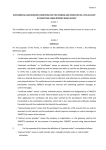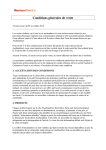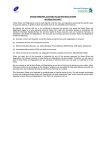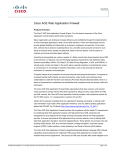Download Arete
Transcript
Privacy Policy Achieve. Aspire. Ascend. ARETE WEALTH MANAGEMENT PRIVACY STATEMENT Arete Wealth Management respects your privacy and is committed to protecting it at all times. This Privacy Statement explains how we collect, use, and safeguard information. Effective Date: 03/07/13 Information We Collect About You Online We want you to get the most out of your visits to our website. To provide our users with online tools, we will, from time to time request that you provide us with your personal information, such as your name, address, email address and telephone number. We may also receive your contact information via a third-party website if you request information about financial products and services on another website. 1)Website users : We will ask you for certain contact information when you request information on our services, or register for online services and products. 2)Arete Wealth Management clients : We will ask you for certain personal information if you want to access your Arete Wealth Management accounts online or request online services and products so we can provide you with secure online account access or the requested services or products. In some instances, we will need to supplement the information you provided with certain personal information about you obtained from third parties to process your online transaction, such as a credit check when applying for a brokerage margin account.We will maintain information about your account, online account activity, online services and products requested and your usage of our website to help us administer your online account needs and to continually improve your online experience by providing you with customized, relevant information and offers. TO PARENTS OF CHILDREN UNDER 13 We do not knowingly solicit data online from or market online to children under the age of 13. If you are a parent or guardian of a child under the age of 13 and believe that personal information may have been collected about such child, please see How We Use The Information We Collect and Your Opt-Out Choices. How We Use The Information We Collect Whether you are a new website user or an Arete Wealth Management client, we use personal information collected on our website to handle the transactions you initiate. In some instances, we will share your contact information with carefully selected service providers to assist us in processing your online transactions or to deliver the services, products, and marketing you request online. For example, in order to mail you a financial guide you request online, we will supply your contact information to a third party vendor who will process and mail the guide, and other materials you request on the behalf of Arete Wealth Management. In an effort to ensure that you get the most out of your visits to our website, we may use your personal information in combination with other information we have about you as an Arete Wealth Management client and information provided to us by third parties to present you with customized and relevant information and offers. For example, we may send offers pertinent to your home ownership that may help you protect your assets. To better meet your overall financial needs, we may also share your information with our affiliates who we believe can offer complementary services or products to our clients or that we believe may be of particular interest to Arete Wealth Management clients. Tracking Activity On Our Website In order to make your visit to our website as productive as possible, we track activity on our website. However, we want you to know that the tracking technology we use does not identify any personal information about you. They cannot retrieve data from your hard drive, pass on computer viruses, or capture any personal information about you, such as your name, address, phone number, or email address. We only know who you are if you tell us. You may, however, be asked to provide personal information such as name, address, phone number or email address to us when you request information from us, or register for online services or products. 2 | P R I VA C Y P O L I C Y 1) Cookies: One way we track activity is by using cookies. A “cookie” is an electronic file that holds small strings of text. When you visit our website, we send a cookie to your browser so that we can recognize it when you or another user of your computer return to our website. We want to recognize your browser so we can make the best use of your time when visiting our website. For your security, if you are registered for online services and/or have an account with Arete Wealth Management we can not give you access to your account information on our website unless your browser is set to accept cookies from us. 2) Browser settings : You can adjust many browser preferences so that you are alerted when a cookie is placed in your browser, or adjust preferences to decline cookies altogether. In addition to allowing us to recognize you, cookies also enable us to securely provide our registered users with account information. How We Use Your Email Address We recognize that email can be the preferred mode of communication for some of our website users. If you provide us with your email address when registering for an online service or product or when accessing your account online, we will use it to contact you about online services and products for which you have registered or about your account. We may use your email address to send you the following types of email messages: • Service notifications related to your accounts(s) • Regularly scheduled email newsletters related to Arete Wealth Management • Products or services you are enrolled in • Requests for names and contact information of individuals you think could benefit from our products or services • Optional email communications which you have signed up for (e.g., newsletters on a selected financial topic) • Occasional updates about our products and services as well as Arete Wealth Management marketing offers • Valuable offers from non-affiliated companies that we send you on their behalf Also, once you have requested information from us, we may communicate with you via email regarding your request to provide additional information related to your initial information request. For example, we may send you materials to help you prepare for an upcoming meeting with an Arete Wealth Management advisor. However, we will never ask you to send personal information such as account or Social Security numbers by non-secure email. To make our email offers more relevant to you, we may use information you provided in your initial transaction with us, in surveys, from information we have about you as an Arete Wealth Management client and information available from external sources such as census bureau data. We do not share your email address with non-affiliated companies for them to market their products or services directly to you. However, we may partner with selected non-affiliated companies to offer certain products or services we believe may be of interest to you. You may receive email offers from other companies for Arete Wealth Management products and services if you registered to receive third-party offers on their website, or if you receive ongoing email newsletters from the other companies that include third-party ads. If you have recently opted out of receiving email offers from Arete Wealth Management, we will process and honor your request as soon as administratively possible. In certain circumstances, you may receive email offers for Arete Wealth Management products and services from other companies during the time period when we are processing your opt-out request. To opt-out of receiving offers or email newsletters from other companies, follow the instructions provided by those companies. Ads That Link To Our Website Arete Wealth Management may use third parties to place banner ads on other websites and will perform tracking and reporting activities through use of Ad Servers. We do not provide Ad Servers with your personal information and Ad Servers do not collect your personal information. 3 | P R I VA C Y P O L I C Y Ad Servers are subject to their own privacy policies. If you would like more information about the privacy policies of these Ad Servers, including information on how to opt-out of their tracking methods, please click here to visit the Network Advertising Initiative website. How We Safeguard Your Information Arete Wealth Management realizes how important security is to you, so we’ve taken a number of steps to enhance the protection of personal or confidential information sent to, or from Arete Wealth Management over the Internet. First, we require that a “secure session” be established, using Secure Socket Layer (SSL) Technology. This is done any time you supply or access personal or confidential information in one of our secure online areas. SSL Technology creates a private conversation that only your computer and Arete Wealth Management systems can understand. The SSL Technology encodes information as it is being sent over the Internet between your computer and Arete Wealth Management systems, helping to ensure that the transmitted information remains confidential. The use of SSL requires two components: an SSL-compatible browser and a Web server to perform the “key-exchange” that establishes a secure connection to Arete Wealth Management Web server systems. In addition, all of our secure sites require that your browser support 128-bit encryption. In order to securely access your personal information via our website, you will need the latest browser version available with SSL and 128 bit encryption capabilities. Second, many areas of the site require the use of a user ID and password as an additional security measure that helps protect your confidential information. This allows Arete Wealth Management to verify who you are, thereby allowing you access to your account information, and preventing unauthorized access. When you have finished using a secure area of Arete Wealth Management, make sure you always click on the “Log Out” link which appears on the top of every secure page. When you click on it, no further secure transactions can be conducted without re-entering your user ID and password. This also helps prevent unauthorized access to your account if you walk away from your computer. You should be aware that browser software often “caches” a page as you look at it, meaning that some pages are saved in your computer’s temporary memory. Therefore, you may find that clicking on your “Back” button shows you a saved version of a previously viewed page. Caching in no way affects the security of your confidential user ID or password. If you use a computer in a public place to access your account information, simply quit/exit the browser software before leaving to minimize the possibility of anyone else viewing your confidential information. Third, in order to bring you the many online products and services offered on aretewealth.com, we work with carefully selected vendors and non-affiliated companies. If we have to share any information with these companies in order to provide a product or service to you, we first conduct a careful evaluation of their information and security systems and practices, and require administrative, technical, and physical safeguards to ensure the security and confidentiality of Arete Wealth Management client information. At any time, we may audit these companies to verify the continued security of their systems and practices. Lastly, you should be aware that other Internet sites that you link to from the Arete Wealth Management site or an Arete Wealth Management email may contain privacy provisions that differ from the provisions of our Privacy Statement. To ensure your privacy is protected, we recommend that you review the privacy statements of other Internet sites you visit. Your Opt-Out Choices We strive to send you email communications that are informative and relevant, but also appreciate that you are in the best position to evaluate the type and frequency of our communications to you. There are two types of email communications we will send to you: service communications and marketing communications. Service communications may include information about your online registration, verification that your account has been accessed online, in response to a service related inquiry or confirmation of an online transaction. Marketing communications may include information about Arete Wealth Management services and products, newsletters, and joint or special offers or information from our selected non-affiliated companies and Arete Wealth Management affiliates. 4 | P R I VA C Y P O L I C Y To opt-out of receiving email offers or newsletters, click here. All email offers and email newsletters sent to you by Arete Wealth Management provide instructions on how to opt-out of receiving future offers or newsletters. These instructions are located at the bottom of the email message. You may receive separate newsletters pertaining to different Arete Wealth Management products and services that you are enrolled in automatically when you register for those products or services. In this case, you must reply to and decline the newsletters individually. If you opt-out, we will still send you email with service updates as well as other important information related to the Arete Wealth Management online products or services for which you have signed up. How You Can Protect Your Personal Information Identity Theft 101 Identity theft occurs when someone uses your name or personal information, such as your Social Security number, driver’s license number, credit card number, telephone number or other account numbers, without your permission. Identity thieves use this information to open credit accounts, bank accounts, telephone service accounts, and make major purchases—all in your name. Information can be used to take over your existing accounts, or to open new accounts. Identity theft can result in damage to your credit rating and denials of credit and job offers. EXAMPLE #1 - One evening, you sit down to pay your monthly bills. You write the checks, toss the statements in the trash and put the container out on the curb for the morning’s trash pick-up. While you sleep, “dumpster-divers” go through your trash looking for the papers you’ve thrown away. They discover a gold mine of information that can be used for fraudulent purposes—your name, address, phone number, utility service account numbers, credit card numbers, and your Social Security number. EXAMPLE #2 - You receive an email message from what appears to be your Internet Service Provider (ISP). The message requests that you update the information they have on file about you—your name, credit card number, bank account number, etc.—by replying to the email or going to a specific website address to provide the information. However, neither the message nor the website address is from your ISP. They belong to someone who wants to get your information to steal your identity. Preventing Identity Theft 1) Secure your personal information at home and at work. Consider keeping your sensitive personal information such as bank, mortgage, and credit card statements, Social Security cards, and other documents and passwords, in a safe location accessible only to you. 2) Protect yourself online: Avoid accessing your financial accounts online from public computers at libraries, hotel business centers or at airports. These are prime target areas for thieves using keystroke monitoring tools to steal your usernames and passwords. Use firewalls, anti-spyware and anti-virus software to protect your home computer and regularly update these programs. For more information and helpful tips visit the SEC website or the FINRA site. 3) Shred documents containing your personal information before discarding them. Identity thieves have been known to “dumpster dive” to obtain discarded documents with personal information. 4) Obtain your credit report from each of the three major credit bureaus once every six to 12 months. Review these reports for any inaccurate information, or any transactions that you were not aware of or did not authorize. You may wish to consider occasionally reviewing Credit Bureau Reports on your children. Identity thieves have been known to steal children’s Social Security numbers in order to create fraudulent accounts, as their information is not likely to be reviewed regularly. 5) Avoid giving out personal information over the phone especially when the telephone call is initiated by another party. Identity thieves may pose as a representative of a legitimate organization with whom you do business and may contact you to “verify” your information. 6) Before disclosing any personal information, make sure you know why it is required and how it will be used. 7) Do not give out your Social Security number to people or companies that you do not know. 5 8) Carry only the information you need. Only take with you the credit cards you need, and avoid carrying your Social Security card, your birth certificate or passport, except when necessary. | P R I VA C Y P O L I C Y 9) Have the Postal Service hold your mail if you are going to be gone for a few days or more. Since identity thieves have been known to obtain personal information by collecting an individual’s mail, promptly remove your incoming mail from your mailbox and place outgoing mail in post office collection boxes. Have the Postal Service hold your mail at the post office if you are planning on being away for any period of time. Install a locking mailbox if mail theft is a problem in your neighborhood. 10) Create unique passwords and personal identification numbers (PINs) and avoid using easily available information such as mother’s maiden name, date of birth, or the last four digits of your Social Security number. Use passwords on your banking and brokerage accounts, and update all of your passwords regularly. If you need further guidance, you may wish to consult the consumer affairs office of the company involved, the U.S. Better Business Bureau, or your local or state consumer protection agency. Detecting Identify Theft Fortunately, detecting identity theft can be fairly simple for diligent consumers. Just follow these three steps: 1) Contact the Credit Bureaus First contact each of the three national bureaus and request copies of your credit report. EQUIFAX Order Credit Report: 800.685.1111 www.equifax.com EXPERIAN Order Credit Report: 888.397.3742 www.experian.com TRANS UNION Order Credit Report: 800.888.4213 Fax: 714.447.6034 www.transunion.com 2) Review Your Credit Reports Review all three of your credit reports carefully and make sure you: • Recognize all accounts listed in your report and confirm that the balances are in line with your records. • Recognize all persons and entities that have requested or received a copy of your report. (If you do not recognize a person or entity, you may want to inquire further). • Find no inquiries to your credit report for loans or accounts you did not apply for. (If there are accounts you do not recognize, this may be a sign that an identity thief has fraudulently opened an account in your name). • Confirm there are no addresses listed for places you have never lived. (If there are addresses you do not recognize, this may be a sign that an identity thief has redirected your mail). • Check that your Social Security number and employment history are accurate. • Check that all this information is consistent across all three credit bureaus. 3) Correct Your Information 6 | I f you find any incorrect or suspicious information, contact the credit bureau(s) immediately. If the incorrect or suspicious information concerns a particular creditor, you will want to contact that creditor as well. P R I VA C Y P O L I C Y Restoring your good name These step-by-step guidelines were developed by the FTC, and are provided by Arete Wealth Management to help you repair the damage caused by identity theft. Here you’ll find contact information on the relevant authorities, forms and sample documents you can download, as well as useful identity theft links. More information is available from your local police and the agencies themselves. 1) Contact the police Contacting the police allows them to start investigating the crime. You will also want to obtain a copy of the police report, the police report number, and the name of the investigator. Banks, credit card companies, and other agencies may require this information as proof of a crime. • When filing a police report, provide as much documentation as you can to prove you have been a victim of identity theft. Documentation including collection letters, credit reports, and an Identity Theft Affidavit can help the police create a thorough report. • If the identity theft occurred while you were away from home, you may also need to file a police report in the jurisdiction where the theft actually occurred. • Get a copy of the police report to submit to your creditors and others that may require proof of a crime. • Be persistent if necessary. You may be told they cannot provide a report. Be sure to let the police know that you need a report to provide to other agencies in order to resolve the identity dispute. If your local police will not file a report, contact the county and state police. You may also ask that they file a Miscellaneous Incident Report instead. 2) Contact the credit bureaus otify the three major credit bureaus (Equifax, Experian, Trans Union) that you have been a victim of identity N theft and request that your file be flagged with a “Fraud Alert.” Fraud Alerts expire after six months, so you may want to ask how you can extend it if needed. Request copies of your credit report from each bureau to review. If information contained within your report is inaccurate, you may dispute it and request that it be changed. Request your credit report again in a few months. This will help you confirm that the requested changes have been made and whether your report has been changed without your knowledge. This may also identify additional occurrences of identity theft. EQUIFAX Order Credit Report: 800.685.1111 Report Fraud: 800.525.6285 www.equifax.com EXPERIAN Order Credit Report: 888.397.3742 Report Fraud: 888.397.3742 www.experian.com TRANS UNION Order Credit Report: 800.888.4213 Report Fraud: 800.680.7289 Fax: 814.447.6034 www.transunion.com ou may also want to file a “Victim Statement” with the bureaus asking them to notify you before any new acY counts are opened or any existing accounts are changed in your name. This may reveal illicit attempts to open additional accounts in your name. 7 | P R I VA C Y P O L I C Y 3) Close Suspect Accounts Close the accounts you know or suspect involve identity fraud. Checks If your checks have been stolen or you suspect they have been misused, contact your financial institution to stop payments. Familiarize yourself with your state’s laws concerning stolen and forged checks. You can contact your State Attorney General’s office or local consumer protection agency to find out about any laws in your state related to identity fraud. Most states hold the financial institution responsible for losses related to a forged check. However, it may be your responsibility to notify the financial institution of the possible forgery in a timely manner. You may also want to contact the major check verification companies directly. These companies can alert retailers who use their databases not to accept your checks : Telecheck: 800.710.9898 Certegy, Inc: 800.437.5120 You can also find out if the thief has been passing bad checks on your account by calling SCAN at 800.262.7771. Credit Accounts and ATM Cards eport the incident to all institutions with which you hold credit card and ATM cards. Ask the financial instiR tution or agency to send you a fraud dispute form to complete. When reopening new accounts, be sure to use new PINs to reduce the risk of future identity theft. If your financial institution is not assisting you with the issues related to your identity theft, you may contact the agency with jurisdiction over your financial institution. If you are not sure what agency has jurisdiction over your particular financial institution, you can find out by visiting www.ffiec.gov/enforcement.htm. If you suspect your investment or brokerage accounts have been altered without your permission, report it to the Securities and Exchange Commission. You can file a report using their online Complaint Center at www. sec.gov/complaint.shtml. Keep in mind that each creditor may have its own process for handling a case of identity theft. Therefore, be sure to specifically ask each creditor what its process is, what is expected of you, and what you can expect from them. 4) Contact the authorities Federal Trade Commission FTC counselors can take your report and provide additional advice on how to proceed if you believe you may have been a victim of identity theft. Their website is full of tips and also provides information on how to learn about laws in your state pertaining to identity theft. Also review, “Take Charge: Fighting Back Against Identity Theft”. Federal Trade Commission Identity Theft Clearinghouse Federal Trade Commission 600 Pennsylvania Avenue NW Washington, D.C. 20580 (877) IDTHEFT (438.4338) www.consumer.gov/idtheft Social Security Administration The SSA Office of the Inspector General investigates allegations of identity theft. If you know or suspect your SSN may be involved in the identity theft against you, you may want to contact the SSA to notify them, and to request a copy of your Social Security statement. 8 | P R I VA C Y P O L I C Y Social Security Administration SSA Fraud Hotline P.O. Box 17768 Baltimore, MD 21235 800.269.0271 Email: [email protected] U.S. Postal Inspection Service The USPIS is the law enforcement entity of the U.S. Postal Service and is the entity that investigates identity theft - specifically when the identity theft involves stolen mail or other violations of the integrity of the mail service. U.S. Postal Inspection Service 475 L’Enfant Plaza, S.W. Washington, D.C. 20260 800.372.8347 www.usps.gov/websites/depart/inspect Federal Bureau of Investigation FBI Internet Fraud Complaint Center www.fbi.gov 5) Keep a Record of Your Actions 6) Additional Fraud Resources • Keep a file of documents related to the identity theft. You will want to include documents such as disputed bills, credit reports, police reports, and any correspondence. • Maintain a record of your telephone conversations with the persons and agencies you contact for assistance. Be sure to record the date and time of the call, the name and title of the person you spoke with, and the things you discussed. • Follow up all telephone conversations in writing and send these letters certified with return receipts requested; maintain copies of these written correspondences for your file. • Maintain copies of any written correspondence you exchange related to the identity theft. • Keep original documents for your file; only mail copies. NON-PROFIT ORGANIZATIONS : Identity Theft Resource Center P.O. Box 26833 San Diego, CA 92196 858.693.7935 Email: [email protected] www.idtheftcenter.org Privacy Rights Clearinghouse 3100 5th Avenue Suite B San Diego, CA 92103 619.298.3396 Email: [email protected] www.privacyrights.org 9 | STATE AND LOCAL GOVERNMENT AGENCIES : ontact your State Attorney General’s office or local consumer protection agency to find out whether your C state has laws related to identity theft. P R I VA C Y P O L I C Y PHISHING FREQUENTLY ASKED QUESTIONS (FAQS) What is phishing? Phishing (pronounced “fishing”) refers to fraudulent communications designed to deceive consumers into divulging personal, financial, or account information. Phishing emails often appear to come from legitimate financial institutions or retailers. Such requests may ask for information including account numbers, passwords, user names or Social Security numbers. These fraudulent emails often create a false sense of urgency intended to provoke the recipient to take immediate action; for example, phishing emails frequently instruct recipients to “validate” or “update” account information or face cancellation. In addition, marketing offers may also be used for attempted phishing. Phishers use a variety of techniques, which may include false “From” addresses, authentic-looking logos, or Web links and graphics. These techniques mislead consumers into believing that they are dealing with a legitimate request for sensitive information. Attachments within an email can also facilitate phishing. Do not open attachments in unfamiliar emails, as they may place programs known as “key stroke loggers” on your PC, which capture keystrokes you make (including when you logon to a site and enter your password). The data obtained can then be used to commit fraud. What does phishing look like? The nature of phishing schemes has evolved and is likely to continue to do so in the future. Currently, online/email phishing is best described by the following characteristics: • Emails using company logos and familiar language reporting a problem and asking you to update your account information by prompt return email or by filling out a website form. • Emails with attachments asking you to install software so that fraudsters can use it to record your key strokes (called Keystroke Logging) and online activity. • Emails that contain typographical or grammatical errors. Spelling errors allow fraudsters to bypass spam filters used by Internet Service Providers (ISPs). • Windows that pop up over a legitimate company’s website asking you to enter personal information. How does phishing work? Phishing works by making an email or website appear to be legitimate, thereby providing potential victims with a false sense of security. The email or website requests the recipient to provide sensitive information, which may later be used to commit fraud. How do I protect myself? Consider whether the company would be likely to ask you for the kind of information being requested. If you are at all in doubt about the authenticity of the communication, contact the company through familiar communication channels (e.g., the phone number provided on account statement). • Do not click on a link in an email when you are not sure of its legitimacy, even if it looks genuine. If you are at all in doubt, contact the company directly. • Avoid emailing personal and financial information. • Never open email attachments from unknown sources. • If you receive an email that you believe could be fraudulent, immediately forward it to Contact us. • Regularly review your account statements. • Do not share IDs/user names and passwords. • Change your passwords regularly. • Be aware that other Internet companies that you do business with may be phished. If you pay an online service and/or have your credit card on file with an Internet based company, be cautious of emails from such companies that request you validate your credit card or checking account numbers. • Install the latest anti-virus and firewall applications to your computer. • Follow your computer manufacturer’s recommendations to ensure that your computer is current on its patches. Refer to your computer’s documentation or user’s manual for further information. • If you feel your Arete Wealth Management account information has been compromised, please contact Arete Wealth Management immediately. 10 | P R I VA C Y P O L I C Y Where do I find more information on how to protect my personal and financial data? The Federal Trade Commission provides useful resources: • “How Not to Get Hooked by the ‘Phishing’ Scam”, available on the Federal Trade Commission website at www.ftc.gov • “Take Charge: Fighting Back Against Identity Theft”, available on the Federal Trade Commission website at www.ftc.gov How do I report suspected phishing attempts? If you receive an email that you believe could be fraudulent, immediately forward it to Contact us. Do not remove the original subject line, or change the email in any way when you forward it to us. If we find it to be fraudulent, we will immediately take appropriate action. • For clients requiring additional assistance, please Contact us. • If you have already responded to an email with your account information and you believe it to be fraudulent, please contact Arete Wealth Management immediately at 847.277.7238. It is strongly recommended that you file a report at www.fbi.gov, www.ftc.gov or www.antiphishing.org. An Important Notice About Client Privacy Protecting your privacy is a top priority of Arete Wealth Management. We value the confidence you have placed in us and are committed to ensuring that the client information we maintain about you is safeguarded. This Privacy Notice (“Notice”) explains how Arete Wealth companies collects, shares and protects your personal information. This Notice also gives you valuable information on the choices you have about how we use your personal information. Please read this Notice carefully to understand what we do. Information We Collect About You We may collect the following types of non public personal information about you from the following sources: 1) information we receive from you on applications or other forms when you open an account, register for one of our products or services (such as your name, address, Social Security number, phone number, email address, assets, income, financial goals, investment objectives); 2) information about your transactions with us (such as your account balance, payment history, parties to transactions, health care information, claims history and use of products and services); and 3) information we receive from a consumer reporting agency (such as your creditworthiness and credit history). We call all of the personal information described above and elsewhere in this Notice “Client Information.” Confidentiality and Security of Client Information We restrict access to nonpublic Client Information to those persons who need to know that information. We maintain physical, electronic and procedural safeguards to protect your Client Information. We will not sell your Client Information to anyone. The Broker Protocol for Recruiting and How it Affects You Arete Wealth Management and Arete Wealth Advisors are both signatories to something called “The Broker Protocol for Recruiting.” This is a document whereby various broker-dealers and investment advisory firms have agreed not to sue each other when representatives choose to move from one firm to another. This agreement stipulates that your advisor is allowed to move to another firm and take certain “Protocol” information with them. This includes client names, addresses, phone numbers, and dates of birth. Advisors are NOT allowed to take account statements, account numbers, detailed position reports or other sensitive information to another firm according to the Protocol. You should be aware that if your advisor decides to leave Arete, they are allowed to take Protocol information about you with them to their new firm. 11 | P R I VA C Y P O L I C Y Use of Client Information We use Client Information for: (1) our everyday business purposes, such as processing transactions, maintaining your account, reporting to credit bureaus, providing financial advice, verifying your identity and fulfilling legal and regulatory obligations; (2) our marketing purposes, namely to offer our products and services to you; and (3) joint marketing with other companies. Disclosure of Client Information to Outside Companies We may share Client Information with outside companies and other third parties in limited circumstances: 1) to help us process transactions for your account; 2) to service your account or perform other business functions on our behalf, such as mail and print services; 3) when disclosure is required or permitted by law. For example, we may be required to disclose Client Information to cooperate with law enforcement and regulatory authorities, to resolve client disputes and to perform credit checks and authentication procedures to prevent fraud; and 4) when we enter into a joint marketing agreement with another financial institution to provide financial products and services that we believe may be of benefit to you. When we share Client Information with outside companies or third parties, we require them to safeguard this information and only use it for the agreed upon purpose. We do not share Client Information, except as described in this section, with outside companies so they can market their products and services directly to you. However, we may use Client Information to send you marketing offers on behalf of selected outside companies for products that they sell. If you respond to one of these offers, the other company will know certain information about you, such as your name, that you are our client and that you met the qualifications established for the offer. You may direct us not to use your Client Information for this purpose as described in Opt-Out Choice A below. You Have Choices About How We Use and Disclose Client Information You have choices about offers that may be sent to you. Your opt-out choices and how to opt out are explained below. We will treat an opt-out instruction by a joint accountholder as applying to all of the associated joint accountholders. A. Offers for Products and Services of Other Companies (Opt-out Choice A) You may direct us not to use your Client Information for the purpose of sending you offers for products and services on behalf of outside companies by selecting Opt-Out Choice AB. To opt out of receiving marketing offers from us on behalf of outside companies, email us. Additional State Opt-out Information In states where additional notification is required before you can provide an effective opt-out, we will contact you separately regarding your opt-out choices. If any of your accounts with us has a Vermont mailing address, we will automatically treat your accounts as if you chose Opt-out Choice A as described in this Notice. Also, we will not obtain consumer credit reports about you without your consent. If any of your accounts with us has a New Mexico mailing address, we will automatically treat your accounts as if you chose Opt-Out Choice A as described in this Notice. Former Clients If you close an account, your account becomes inactive or you are no longer a client, we will continue to treat and safeguard your Client Information as described in this Notice. Internet Privacy Statement and Email Offers We may send you email offers for our products and services, and other companies we work with. However, we do not share email addresses with outside companies for them to market their own products and services to you. To opt out of receiving these email offers, email us. 12 | P R I VA C Y P O L I C Y Arete Wealth Management Companies The Arete Wealth Management brand represents the wide variety of financial products and services available from the Arete Wealth Management companies. More information is available from your financial advisor or on our website: aretewealth.com. OPT-OUT CHOICES: If you choose to opt out as described In this Notice, contact us. If you have already given us your choices, you do not need to respond. 13 | P R I VA C Y P O L I C Y


























